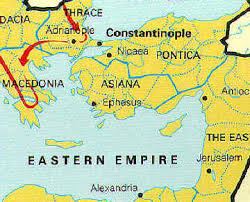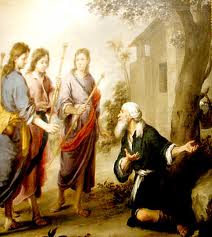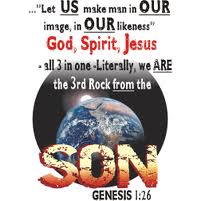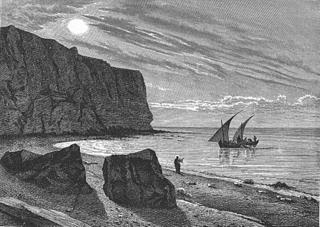CONSTANTINE did not start the TRINITY doctrine at the Council of Nicaea
 The First Council of Nicaea was a council of Christian bishops in Nicaea initiated by the Roman Emperor Constantine I in AD 325, and this was the first effort to reach a consensus in the church concerning some of new teachings that had emerged by this time. Its main accomplishments were settlement of the issue of the nature of Jesus Christ and the observance of the date of Easter.
The First Council of Nicaea was a council of Christian bishops in Nicaea initiated by the Roman Emperor Constantine I in AD 325, and this was the first effort to reach a consensus in the church concerning some of new teachings that had emerged by this time. Its main accomplishments were settlement of the issue of the nature of Jesus Christ and the observance of the date of Easter.
Doctrines and ideas that Constantine did NOT start
Easter, the biblical canon, worship on a Sunday, worshiping of the sun, the trinity…Constantine did not start any new ideas at the council at Nicaea!
When it comes to Easter many get confused due to this English term and fear that this is a pagan holiday. Some even think that Constantine is guilty of introducing this pagan holiday into church, but that is not the case. The English-speaking countries might use the word “Easter” for the holiday which is celebrated right after Good Friday, but other countries rather use the word Passover – or the equivalent in their languages. Passover is certainly not a pagan holiday (and it’s of course not a requirement to celebrate this holiday by decorating the house with chickens, hens, rabbits, eggs, etc), and you can read more about this controversy here. The council at Nicaea was used (among other things) to come to a consensus when it comes to selecting a proper date for the celebration of Easter (Passover), but that is not the same thing as introducing a pagan holiday into church.
There is no record of any discussion of the biblical canon at the council. Constantine commissioned fifty Bibles for the Church of Constantinople the year 331, but it’s not certain whether his request was for fifty copies of the entire Old and New Testaments or not. He did not commission any Bibles at the council itself. No historical evidence points to involvement on his part in selecting books for inclusion in commissioned Bibles. (The books that ended up in the Biblical canon were those who had always been regarded as valid testimonies of Jesus Christ, due to the witnesses that wrote them and due to the time when they were written. So it’s not that a group of people gathered together a few hundred years after the death of Jesus and started the book selection by using a blank sheet of paper and voted about it.)
Constantine cannot be blamed for starting the tradition to celebrate Sabbath on Sunday, since the early christians had already started to do this soon after the death of Jesus. See more here.
Constantine did not introduce the idea to perform sun worship rather than son worship. Sun and son might sound similar in English, but that’s certainly not the case in other languages. Constantine did not even speak English, and the council was not held in English.
The council of Nicaea dealt primarily with the issue of the deity of Christ. Over a century earlier the use of the term “trinity” (Τριάςin Greek; trinitas in Latin) could be found in the writings of Origen (185-254) and Tertullian (160-220), and a general notion of a “divine three” was expressed in the second century writings of Polycarp, Ignatius, and Justin Martyr. See some quotes below. The concept of the deity of Christ and the trinity can be found in numerous places in the Bible, as well as in the writings of the early church fathers – before the council at Nicaea took place.
It’s unfortunate that some christians get the wrong idea that certain doctrines started at Nicaea just because they were discussed there and just because a consensus was reached. If for instance the concept of the trinity (and/or deity of Christ) had its roots in the council at Nicaea, it shouldn’t have been taught prior to it – and particularly not in the Bible – but we can see that the contrary is the case. If both the Bible and the early church fathers (before the council at Nicaea) teach the same thing, it’s good evidence for that it can be trusted. One new idea which was introduced into church several hundred years after the death of Christ (around the time of Augustine), is the doctrine of the original sin – which only the gnostics taught. Augustine made this doctrine popular also in church, despite that the early church fathers before him fought against this gnostic doctrine. The doctrine of the trinity, however, has always been taught in the Bible and among the first church fathers. You can read more about the evidence for the trinity here.
Arianism (with its Trinitarian controversy) must not be looked upon as an isolated theory by its founder Arius
The council did triumph over Arianism but confusion in theological terminology was the main reasons for a long drawn out battle. Arius regarded the Logos (word) as no more than a power of the Father, and he believed that before time began the Father had created the Son by the power of the Word to be His agent in creation. The Son was therefore not to be identified with the Godhead, and he was only God in a derivative sense. Since there was once a time when he did not exist, he could not be eternal, and he was actually neither proper God (since God the Father was before him and created him) nor proper man (since he was above all men due to his direct creation by God). Arius’ views began to spread among the people and Alexander the Bishop called a meeting of his priests and deacons to discuss the matter. The Bishop insisted on the unity of the Godhead, but Arius continued to argue that since the Son was begotten of the Father then at some point he began to exist. The argument ended up dividing the church. Athanasius and friends insisted that the Son was as truly God as the Father.
Emperor Constantine was upset by this division so he summoned a conference of all the bishops of the church – but few representatives from the western churches made it to the meeting in Nicaea. There were still around 300 bishops, and the council agreed that Jesus is truly God, so it published a creed stating the Christian faith in a way that condemned Arianism. One account from the meeting is from History of the Church by Socrates Scholasticus (who wrote 100 years after Eusebius). Much of his account consists of direct quotations from Eusebius’s Life of the Constantine and from a letter of the earlier historian – and Eusebius was present at the council. Eusebius, bishop of Nicomedia (not to be confused with Eusebius Pamphilus, Bishop of Caesarea) supported the opinion of Arius. These were opposed by Athanasius, a deacon of the Alexandrian church. This creed was agreed to by 318 members, and there were only five who refused to sign – objecting to the term homoousios, “of the same substance”. The Emperor sent Arius into exile, along with Eusebius and Theognis and their followers. Eusebius and Theognis, however, wrote a declaration that they had changed their opinion and now agreed that the Son and the Father are of the same substance.
Quotes from old church fathers about the deity of Christ and the trinity
Jesus is not only the son of God, but also GOD IN FLESH.
For OUR GOD JESUS CHRIST, was, according to the appointment of God, conceived in the womb by Mary, of the seed of David, but by the Holy Ghost.” (Epistle of Ignatius to the Ephesians 4:9)
”…GOD HIMSELF appearing in the form of a man, for the renewal of eternal life.” (Epistle of Ignatius to the Ephesians 4:13)
”Continue inseparable from JESUS CHRIST OUR GOD.” (Epistle of Ignatius to the Trallians 2:4)
”For even OUR GOD; JESUS CHRIST, know that He is in the Father”. (Epistle of Ignatius to the Romans 1:13)
Brethren, WE OUGHT SO TO THINK OF JESUS CHRIST AS OF GOD : as of the judge of the living and the dead”. (2nd Epistle of Clement to the Corinthians 1:1)
”For Christ is King, and Priest, and GOD and Lord…” (Justin Martyr, Dialogue With Trypho, 34)
”…He preexisted as the Son of the Creator of things, BEING GOD, and that He was born a man by the Virgin.” (Justin Martyr, Dialogue With Trypho, 48)
”Now may the God and Father of our Lord Jesus Christ, and the eternal High Priest Himself, THE GOD JESUS CHRIST, build you up in the faith…” (The Epistle of Polycarp to the Church at Philippi, 12)
”In order that to Christ Jesus, our Lord, and GOD, and Savior, and King…” (Irenaeus Against Heresies, 1.10.1)
”But he Jesus is himself in his own right, beyond all men who ever lived, GOD, Lord, and king eternal, and THE INCARNATE WORD, proclaimed by all the prophets, the apostles …The Scriptures would not have borne witness to these things concerning Him, if, like everyone else, He were mere man.” (Irenaeus Against Heresies 3:19.1-2)
”For with Him were always present the Word and Wisdom, the Son and the Spirit, by whom and in whom, freely and spontaneously, He made all things, to whom also He speaks, saying, ‘Let us make man after our image and likeness’”.(Irenaeus Against Heresies, 4:10)
Irenaeus, 115-190 ”The Church, though dispersed throughout the whole world, even to the ends of the earth, has received from the apostles and their disciples this faith: …one God, the Father Almighty, Maker of heaven, and earth, and the sea, and all things that are in them; and in one Christ Jesus, the Son of God, who became incarnate for our salvation; and in the Holy Spirit, who proclaimed through the prophets the dispensations of God, and the advents, and the birth from a virgin, and the passion, and the resurrection from the dead, and the ascension into heaven in the flesh of the beloved Christ Jesus, our Lord, and His manifestation from heaven in the glory of the Father ‘to gather all things in one,’ and to raise up anew all flesh of the whole human race, in order that to Christ Jesus, our Lord, and GOD, and Savior, and King, according to the will of the invisible Father, ‘every knee should bow, of things in heaven, and things in earth, and things under the earth, and that every tongue should confess; to him, and that He should execute just judgment towards all…’” (Against Heresies X.l)
Tertullian, 160-225 ”We define that there are two, the Father and the Son, and three with the Holy Spirit, and this number is made by the pattern of salvation… [which] brings about unity in trinity, interrelating the three, the Father, the Son, and the Holy Spirit. They are three, not in dignity, but in degree, not in substance but in form, not in power but in kind. They are of one substance and power, because there is one God from whom these degrees, forms and kinds devolve in the name of Father, Son and Holy Spirit.” (Adv. Prax. 23; PL 2.156-7).
”We have also as a Physician the Lord OUR GOD JESUS THE CHRIST the only-begotten Son and Word, before time began, but who afterwards became also man, of Mary the virgin. For ‘the Word was made flesh.’ Being incorporeal, He was in the body; being impassible, He was in a passable body; being immortal, He was in a mortal body; being life, He became subject to corruption, that He might free our souls from death and corruption, and heal them, and might restore them to health, when they were diseased with ungodliness and wicked lusts.” (Alexander Roberts and James Donaldson, eds., The ante-Nicene Fathers, Grand Rapids: Eerdmans, 1975 rpt., Vol. 1, p. 52, Ephesians 7.)
Abraham’s meeting with GOD and two angels
” I [Justin] inquired. And Trypho said, ”Certainly; but you have not proved from this that there is another God besides Him who appeared to Abraham, and who also appeared to the other patriarchs and prophets. YOU HAVE PROVED, however, that we [the Jews] were WRONG in believing that the three who were in the tent with Abraham were all angels.” I [Justin] replied again, ”If I could not have proved to you from the Scriptures that ONE OF THOSE THREE IS GOD, because, as I already said, He brings messages to those to whom God the Maker of all things wishes [messages to be brought], then in regard to Him who appeared to Abraham on earth IN HUMAN FORM IN LIKE MANNER AS THE TWO ANGELS who came with Him, and WHO AS GOD EVEN BEFORE THE CREATION OF THE WORLD, it were reasonable for you to entertain the same belief as is entertained by THE WHOLE OF YOUR NATION.” ”Assuredly,” he said, ”for up to this moment this has been our [the Jews] belief.” … ”And now have you not perceived, my friends, that one of the three, WHO IS BOTH GOD AND LORD, and ministers to Him who is in the heavens, is Lord of the two angels? For when [the angels] proceeded to Sodom, HE REMAINED BEHIND, and COMMUNED WITH ABRAHAMin the words recorded by Moses; and when He departed after the conversation, Abraham went back to his place. And when he came [to Sodom], the two angels no longer conversed with Lot, but Himself, as the Scripture makes evident; and He is the LORD who received commission from the LORD who [remains] in the heavens, i.e., the Maker of all things, to inflict upon Sodom and Gomorrah the [judgments] which the Scripture describes in these terms: ‘The Lord rained down upon Sodom and Gomorrah sulphur and fire from the Lord out of heaven.’ ”(Dialogue of Justin Martyr, with Trypho, a Jew, Chapter LVI.—God Who Appeared to Moses is Distinguished from God the Father.)
Irenaeus, 115-190 AD
”Therefore neither would the Lord, nor the Holy Spirit, nor the apostles, have ever named as God, definitely and absolutely, him who was not God, unless he were truly God; nor would they have named any one in his own person Lord, except God the Father ruling over all, and His Son who has received dominion from His Father over all creation, as this passage has it: ”The LORD said unto my Lord, Sit Thou at my right hand, until I make Thine enemies Thy footstool.” Here the [Scripture] represents to us the Father addressing the Son; He who gave Him the inheritance of the heathen, and subjected to Him all His enemies. Since, therefore, the Father is truly Lord, and the Son truly Lord, the Holy Spirit has fitly designated them by the title of Lord. And again, referring to the destruction of the Sodomites, the Scripture says, ”Then the LORD rained upon Sodom and upon Gomorrah fire and brimstone from the LORD out of heaven.” For it here points out that the Son, who had also been talking with Abraham, had received power to judge the Sodomites for their wickedness. And this [text following] does declare the same truth:”Thy throne, O GOD; is for ever and ever; the scepter of Thy kingdom is a right scepter. Thou hast loved righteousness, and hated iniquity: therefore GOD, Thy God, hath anointed Thee.” Forthe Spirit designates both [of them] BY THE NAME; OF GOD — both Him who is anointed as Son, and Him who does anoint, that is, the Father.” (Irenaeus, Book 3, ch 6)
Tertullian, 160-225 AD
”That is a still grander statement [of Christ’s deity] which you will find expressly made in the Gospel: ”In the beginning was the Word, and the Word was with God, and the Word was God.” There was One ”who was,” and there was another ”with whom” He was. But I find in Scripture the name Lord also applied to them Both: ”The Lord said unto my Lord, Sit Thou on my right hand.” And Isaiah says this: ”Lord, who hath believed our report, and to whom is the arm of the Lord revealed? ” Now he would most certainly have said Thine Arm, if he had not wished us to understand that the Father is Lord, and the Son also is Lord. A much more ancient testimony [of Christ’s deity] we have also in Genesis: ”Then the Lord rained upon Sodom and upon Gomorrah brimstone and fire from the Lord out of heaven.” Now, either deny that this is Scripture; or else (let me ask) what sort of man you are, that you do not think words ought to be taken and understood in the sense in which they are written, especially when they are not expressed in allegories and parables, but in determinate and simple declarations?” (Tertullian, Against Praxeas, Chapter XIII.
Ignatius, 30-117 AD
”For Moses, the faithful servant of God, when he said, ”The Lord thy God is one Lord,” and thus proclaimed that there was only one God, did yet forthwith confess also our Lord [Jesus] when he said, ”The Lord [Jesus] rained upon Sodom and Gomorrah fire and brimstone from the Lord.” And again [he confessed a second time our Lord Jesus by saying], ”And God said, Let Us make man after our image: and so God made man, after the image of God made He him.”” (The Epistle of Ignatius to the Antiochians, Chapter II.—The True Doctrine Respecting God and Christ.)
Cyprian, 200-258 AD
”In the Gospel according to John: ”The Father judgeth nothing, but hath given all judgment unto the Son, that all may honour the Son as they honour the Father. He who honoureth not the Son, honoureth not the Father who hath sent Him.” Also in the seventy-first Psalm: ”O GOD, give the king Thy judgment, and Thy righteousness to the king’s son, to judge Thy people in righteousness.”Also in Genesis: ”And the LORD rained upon Sodom and Gomorrah sulphur, and fire from heaven from the LORD.”” (The Treatises of Cyprian, Treatise XII. Three Books of Testimonies Against the Jews. Third Book., Testimonies., 33. That the Father judgeth nothing, but the Son; and that the Father is not glorified by him by whom the Son is not glorified.)
Novatian, 200–258 AD
”For who does not acknowledge that the person of the Son is second after the Father, when he reads that it was said by the Father, consequently to the Son, ”Let us make man in our image and OUR likeness; ” and that after this it was related, ”And God made man, in the image of God made He him? ”Or when he holds in his hands: ”The LORD rained upon Sodom and Gomorrah fire and brimstone from the LORD from heaven? ” (A Treatise of Novatian Concerning the Trinity, Chapter XXVI. Argument.—Moreover, Against the Sabellians He Proves that the Father is One, the Son Another.)
”Therefore the Lord overturned Sodom, that is, GOD overturned Sodom; but in the overturning of Sodom, the LORD rained fire from the LORD. And this Lord was the God seen by Abraham; and this God was the guest of Abraham, certainly seen because He was also touched. But although the Father, being invisible, was assuredly not at that time seen, He who was accustomed to be touched and seen was seen and received to hospitality. BUT THIS THE SON OF GOD,”The LORD rained from the LORD upon Sodom and Gomorrha brimstone and fire.”And this is the Word of God. And THE WORD OF GOD WAS MADE FLESH, AND DWLTH AMNG US; AND THIS IS CHRIST. IT WAS NOT THE FATHER, THEN WHO WAS A GUEST WITH ABRAHAM, BUT CHRIST. NOR WAS IT THE FATHER WHO WAS SEEN THEN; , BUT THE SON; AND CHRIST WAS SEEN. Rightly, therefore, CHRIST IS BOTH LORD AND GOD, who was not otherwise seen by Abraham, EXCEPT THAT AS GOD THE WORD He was begotten of God the Father before Abraham himself.” (A Treatise of Novatian Concerning the Trinity, Chapter XVIII. Argument.—Moreover Also, from the Fact that He Who Was Seen of Abraham is Called God; Which Cannot Be Understood of the Father, Whom No Man Hath Seen at Any Time; But of the Son in the Likeness of an Angel.)
Constitutions of the Holy Apostles
”To Him did Moses bear witness, and said: ”The LORD received fire from the LORD, and rained it down.” HIM DID JACOB SEE AS A MAN, and said: ”I have seen God face to face, and my soul is preserved.”HIM DID ABRAHAM ENTERTAIN, and acknowledge to be the Judge, and HIS LORD.” (Constitutions of the Holy Apostles, Book V. XX. A Prophetic Prediction Concerning Christ Jesus.)
1 Mos. 1:26 Gud sade: ”Låt oss göra människor till VÅR AVBILD, till att vara lika OSS. De skall råda över fiskarna i havet och över fåglarna under himlen, över boskapsdjuren och över hela jorden och över alla kräldjur som rör sig på jorden.” 27 Och Gud skapade MÄNNISKAN till sin avbild, till GUDS AVBILD skapade han henne, till man och kvinna skapade han dem.
Epistle of Barnabas, 74 AD
”For the Scripture says concerning US, while He speaks to the SON, ”Let Us make man after Our image, and after Our likeness” (Epistle of Barnabas, Chapter VI.—The Sufferings of Christ, and the New Covenant, Were Announced by the Prophets.)
The Letter of Barnabas 74 AD
”And further, my brethren, if the Lord [Jesus] endured to suffer for our soul, he being the Lord of all the world, to whom God said at the foundation of the world, ‘Let us make man after our image, and after our likeness,’ understand how it was that he endured to suffer at the hand of men” (Letter of Barnabas 5)
Justin Martyr, 100-165 AD
Idén att Moses skulle mena att det var änglar som åsyftades med ”till vår avbild”, är en villolära, säger Justin
”In saying, therefore, ‘as one of us, ‘[Moses] has declared that [there is a certain] number of persons associated with one another, and that they are at least two. For I would not say that the dogma of that heresy which is said to be among you (The Jews had their own heresies which supplied many things to the Christian heresies) is true, or that the teachers of it can prove that [God] spoke to angels, or that the human frame was the workmanship of angels. But this Offspring, which was truly brought forth from the Father, was with the Father before all the creatures.” (Dialogue of Justin Martyr, with Trypho, a Jew: Chapter LXII.—The Words ”Let Us Make Man”)
Irenaeus, 115-190 AD
”It was not angels, therefore, who made us, nor who formed us, neither had angels power to make an image of God, nor any one else, except the Word of the Lord, nor any Power remotely distant from the Father of all things. For God did not stand in need of these [beings], in order to the accomplishing of what He had Himself determined with Himself beforehand should be done, as if He did not possess His own hands. For with Him were always present the Word and Wisdom,the Son and the Spirit, by whom and in whom, freely and spontaneously, He made all things, to whom also He speaks, saying, ”Let Us make man after Our image and likeness; ” [Gen. 1:26]” (Against Heresies 4:20:1).
Tertullian, 160-225 AD
”If the number of the Trinity also offends you, as if it were not connected in the simple Unity, I ask you how it is possible for a Being who is merely and absolutely One and Singular, to speak in plural phrase, saying, ”Let us make man in our own image, and after our own likeness; ” whereas He ought to have said, ”Let me make man in my own image, and after my own likeness,” as being a unique and singular Being?In the following passage, however, ”Behold the man is become as one of us,” He is either deceiving or amusing us in speaking plurally, if He is One only and singular. Or was it to the angels that He spoke, as the Jews interpret the passage, because these also acknowledge not the Son? Or was it because He was at once the Father, the Son, and the Spirit, that He spoke to Himself in plural terms, making Himself plural on that very account? Nay, it was because He had already His Son close at His side, as a second Person, His own Word, and a third Person also, the Spirit in the Word, that He purposely adopted the plural phrase, ”Let us make; ”and, ”in our image; ”and, ”become as one of us.” (Tertullian, Against Praxeas, Chapter XII. Other Quotations from Holy Scripture Adduced in Proof of the Plurality of Persons in the Godhead.)
”Since then he is the image of the Creator (for He, when looking on Christ His Word, who was to become man, said, ”Let us make man in our own image, after our likeness”), how can I possibly have another head but Him whose image I am? For if I am the image of the Creator there is no room in me for another head” (Tertullian, Book V, Elucidations, Chapter VIII.—Man the Image of the Creator, and Christ the Head of the Man.)
”In the first place, because all things were made by the Word of God, and without Him was nothing made. Now the flesh, too, had its existence from the Word of God, because of the principle, that here should be nothing without that Word. ”Let us make man,” said He, before He created him, and added, ”with our hand,” for the sake of his pre-eminence, that so he might not be compared with the rest of creation.” (Tertullian: On the Resurrection of the Flesh, Elucidations, Chapter V.—Some Considerations in Reply Eulogistic of the Flesh. It Was Created by God.)
Origen, 184-254 AD
”it was to Him that God said regarding the creation of man, ”Let Us make man in Our image, after Our likeness.” (Origen Against Celsus, Book V, Chapter XXXVII)
Novatian, 200–258 AD
”For who does not acknowledge that the person of the Son is second after the Father, when he reads that it was said by the Father, consequently to the Son, ”Let us make man in our image and our likeness; ” and that after this it was related, ”And God made man, in the image of God made He him? ”Or when he holds in his hands: ”The Lord rained upon Sodom and Gomorrah fire and brimstone from the Lord from heaven? ” (A Treatise of Novatian Concerning the Trinity, Chapter XXVI. Argument.—Moreover, Against the Sabellians He Proves that the Father is One, the Son Another.)
Constitutions of the Holy Apostles
”the divine Scripture testifies that God said to Christ, His only-begotten, ”Let us make man after our image, and after our likeness. And God made man: after the image of God made He him; male and female made He them.”(Constitutions of the Holy Apostles, Book V., VII)
You can read many more quotes in this article






